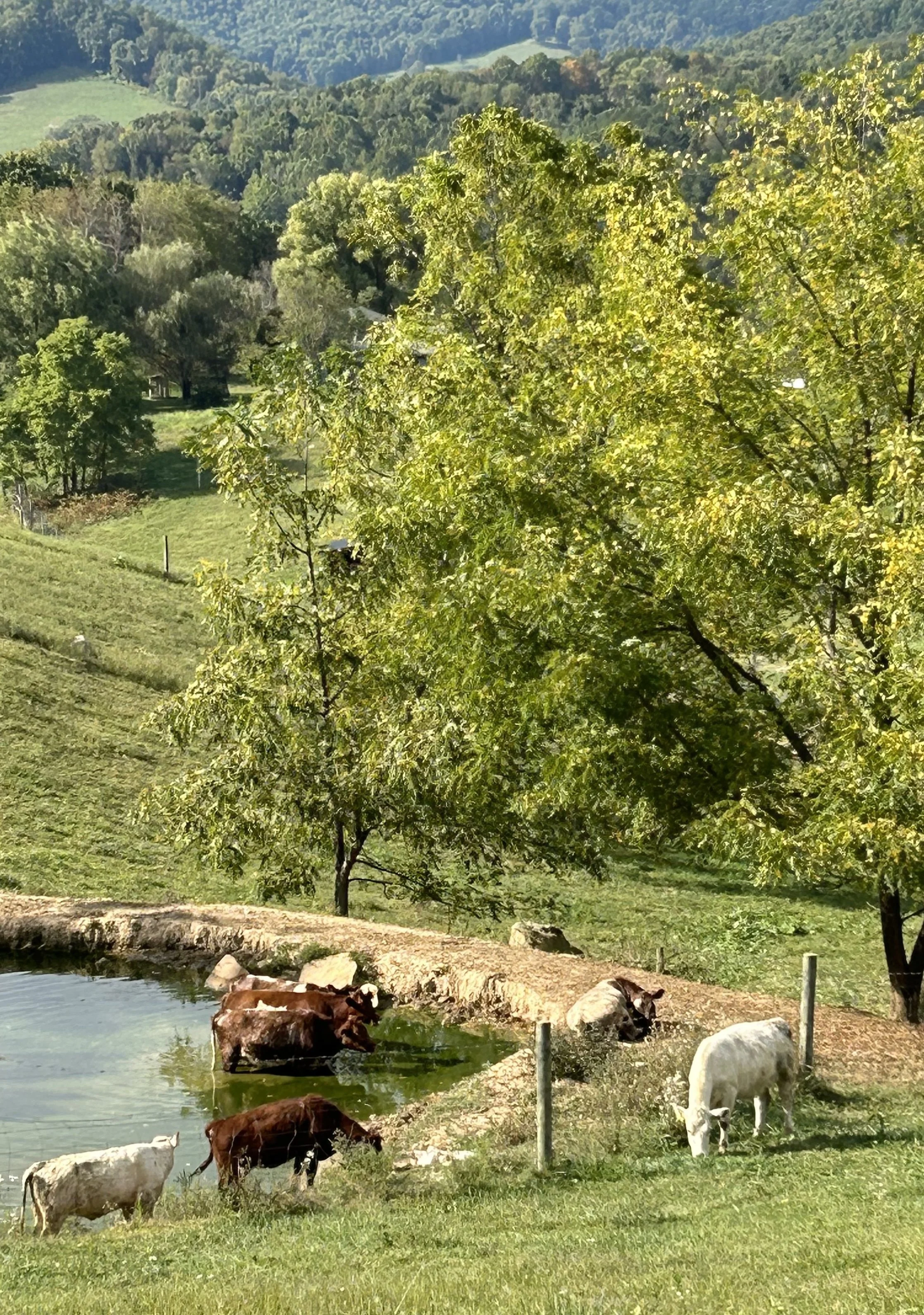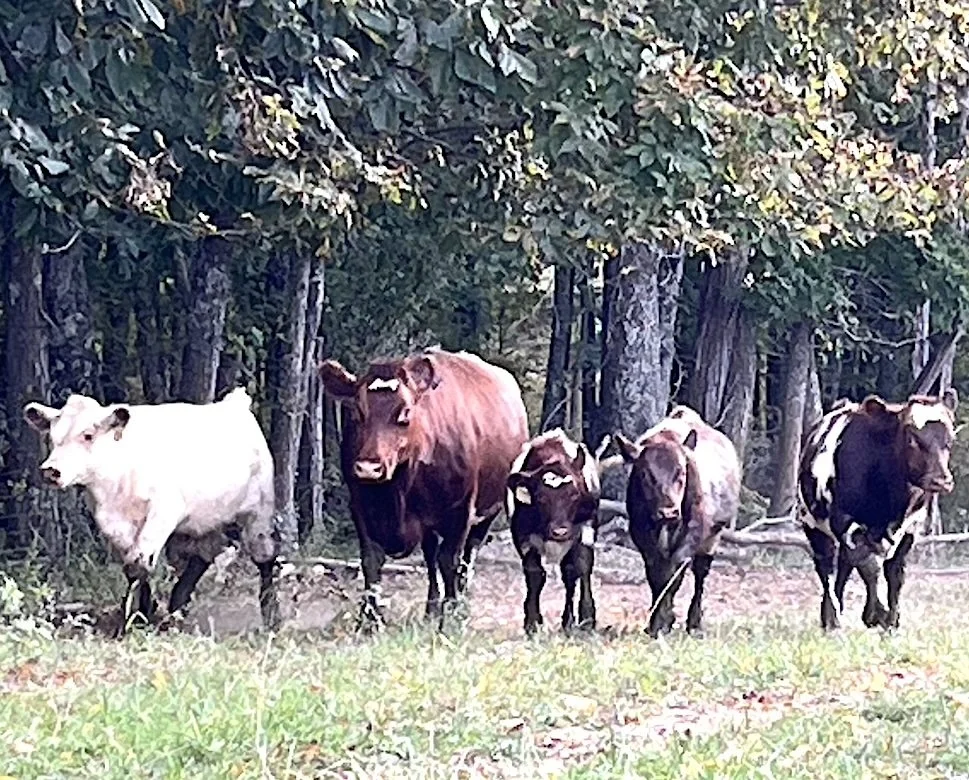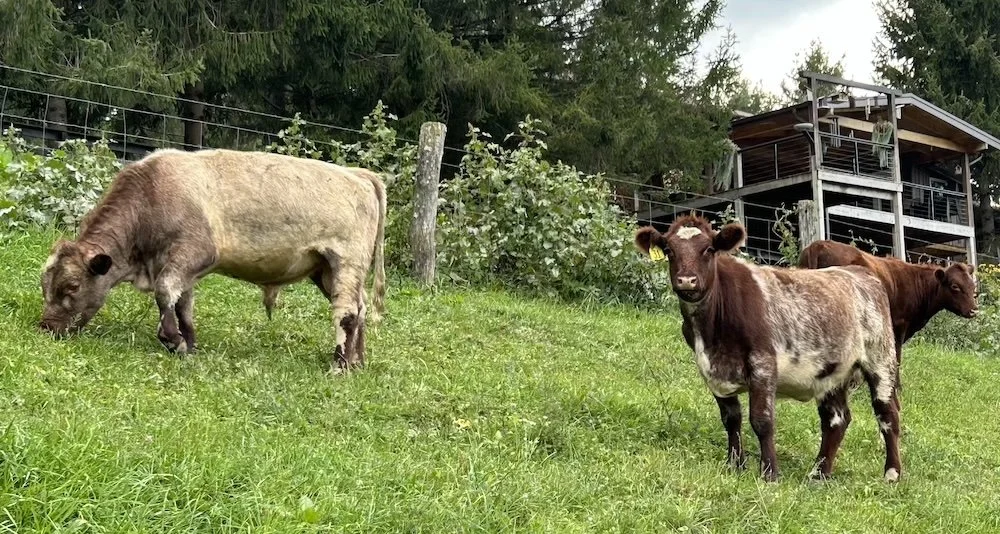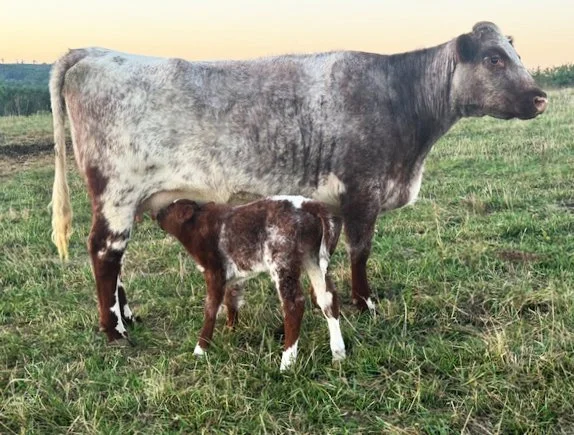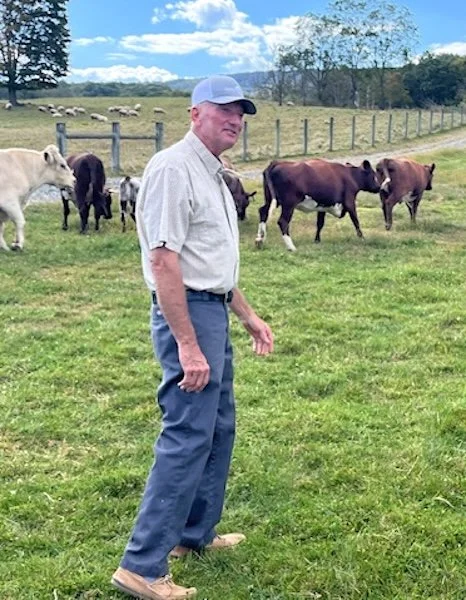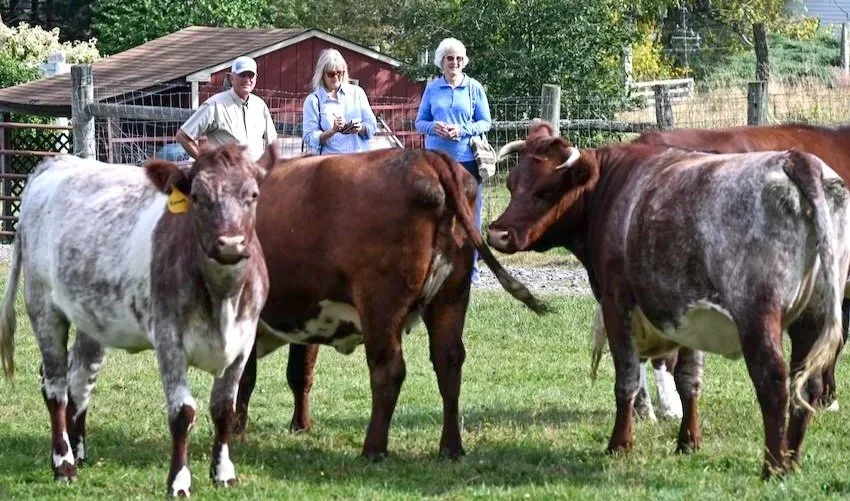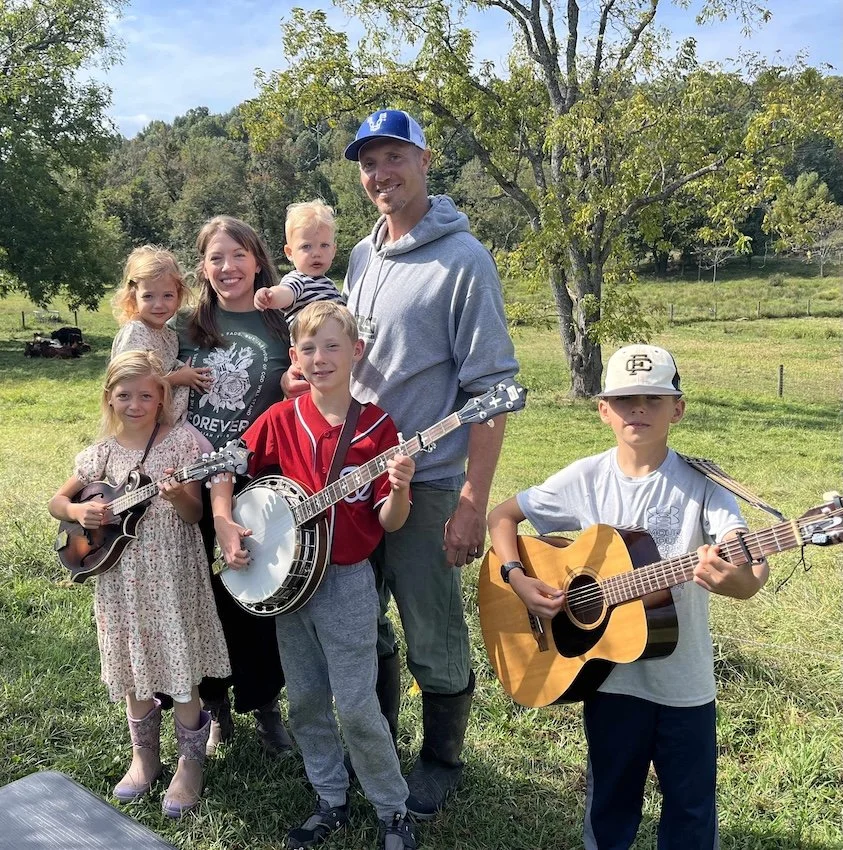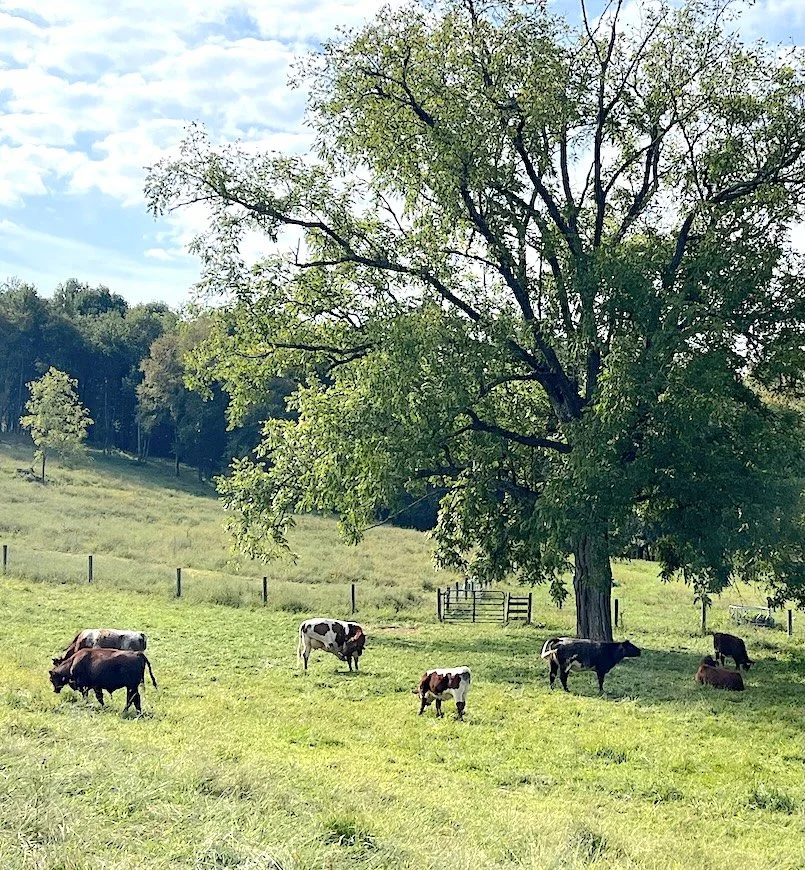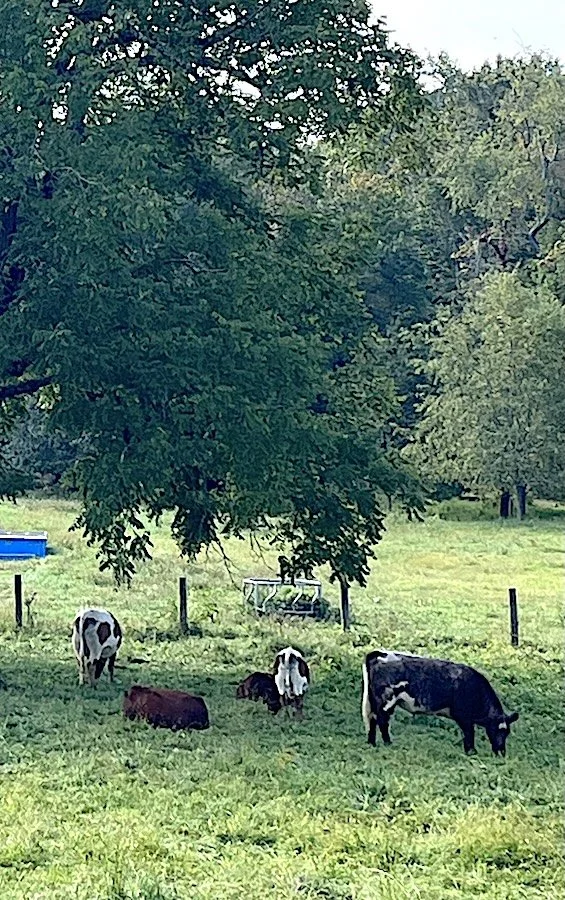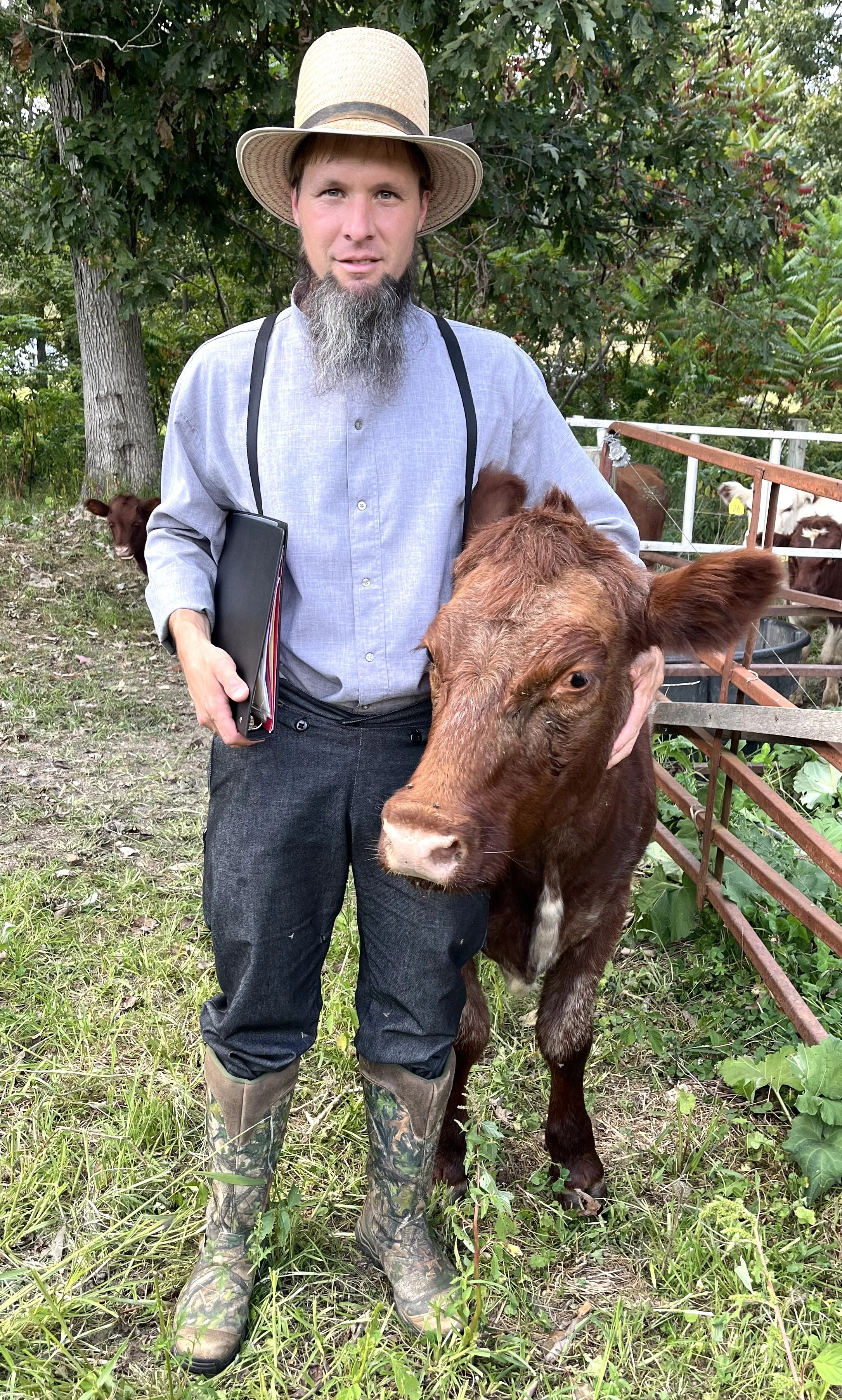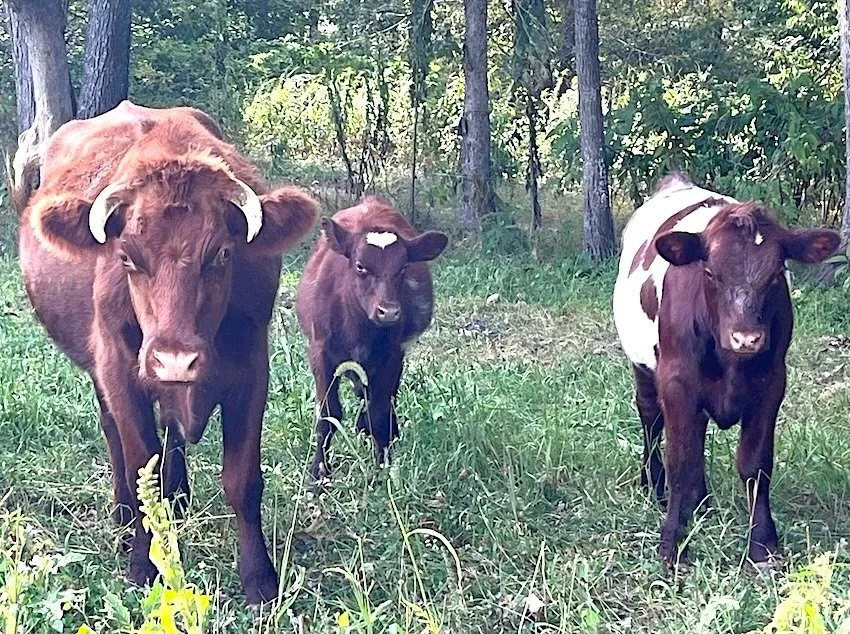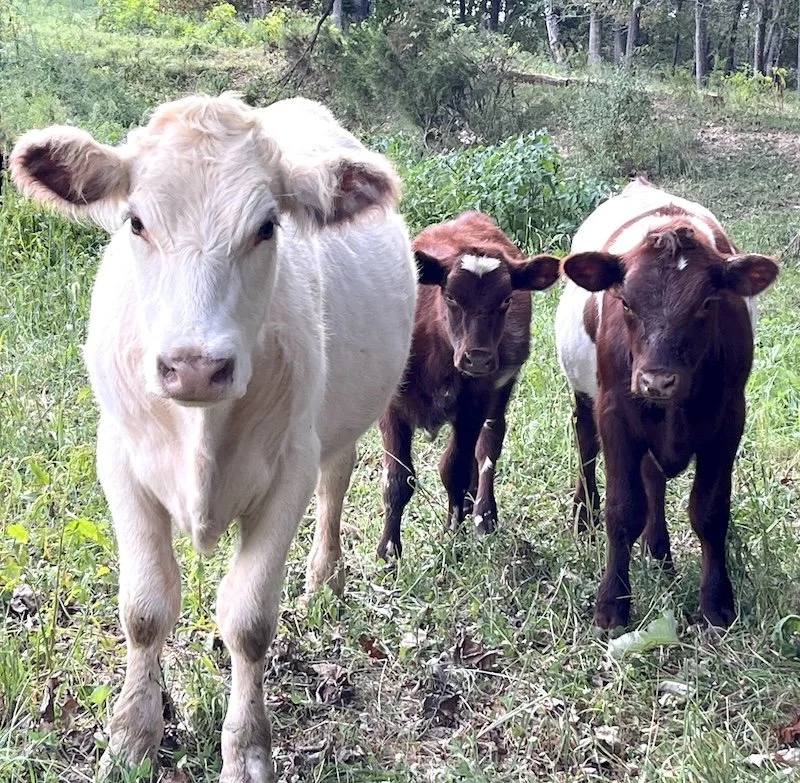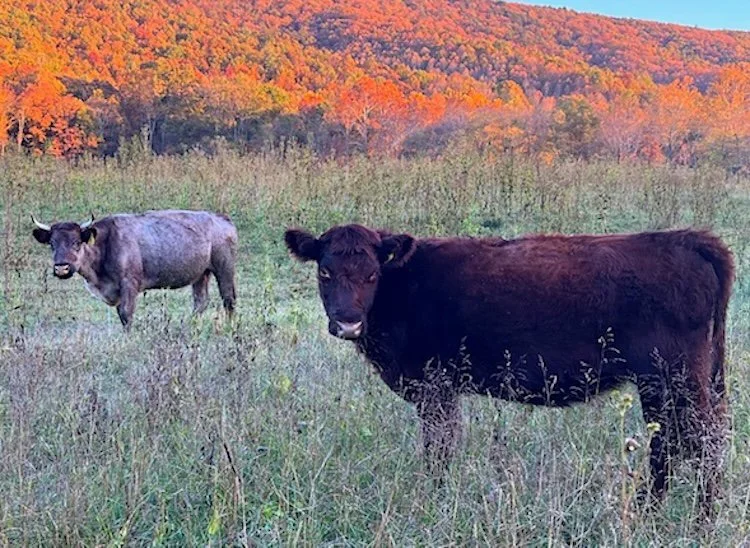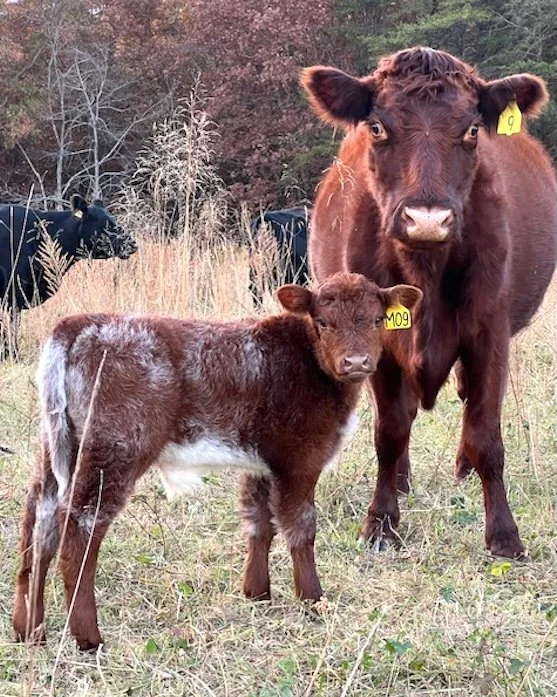Heritage Shorthorn Members in Virginia
The state of Virginia may not be high on the list of states that one thinks of when considering cattle; however cattle breeding in Virginia goes back to Colonial days and even today the state has a number of dedicated cattle breeders, including some who raise Heritage Shorthorns. Currently there are 7 Heritage Shorthorn Society members in Virginia, and on a recent excursion to visit family in Virginia it was decided to visit as many of the HSS members there as possible. They are mainly located in the mid section of Virginia which is a scenically stunning area of rolling hills, fertile green valleys, rivers, and the Blue Ridge Mountains. It is an area which has many available indoor and outdoor attractions, including many things of interest for historical enthusiasts.
Following is an introduction to the various HSS members in Virginia (listed by reverse alphabetical order). Many of these members are relatively new to raising Heritage Shorthorns, although most have extensive backgrounds in farming and agriculture. They are interested in working closely with others in HSS to improve their herds, expand the availability of diverse Heritage genetics, and to promote Heritage Shorthorns in general.
Article by Sue Schallberger and Patricia Anderson
Partnership: David Bender and David Chupp —Benchmark Shorthorns, Pearisburg VA
Dave Bender:
When he was 12 years old, Dave received the runner-up award, a one-year subscription to The Shorthorn World, in an essay contest sponsored by the North Central Illinois Shorthorn Association. The grand prize, a registered heifer, was won by a 17-year-old high school senior whose family already raised Shorthorns. Dave maintained his subscription to the breed magazine through 1975, by which time he was heavily involved in another of his lifelong passions—aviculture—eventually becoming curator of a large collection of native and exotic birds at a wildlife research center in British Columbia, where he also proofread and edited manuscripts and contributed chapters to avian-related books published by the parent company. Unfortunately his 15 year run of the magazine was destroyed when the basement of his brother's home, where most of his books and periodicals were stored while he was away, was flooded. After more than a decade in Canada, Dave returned to the US, bringing a portion of his private bird collection, and was invited to join Sam Chupp along with other partners, in establishing the Mountain View Zoological Gardens on the Chupp farm near Pearisburg, Virginia.
Eventually the older Chupp boys married and either moved away or started their own businesses. Dave was diagnosed with sarcoidosis of the lungs, Sam also developed a respiratory problem, and both were advised to stay away from the birds, so the collection was liquidated. The Chupps also discontinued their farming operation, selling the draft horses and disposing of the remaining ponies. This left some unused hilly pasture and a level hayfield, prompting Dave to subscribe to the current Shorthorn breed magazine. Sam suggested that the two Davids, both interested in cattle, pool their resources to purchase a few cows. Dave, of course, insisted on Heritage Shorthorns, and young David was easily convinced after seeing a picture of a typical roan cow.
David & Lydiann Chupp:
David & Lydia Chupp
David and his wife, Lydiann, have a preschool daughter who enjoys accompanying her Dad around the farm. David had always dreamed about ranching and enjoys working with the Heritage Shorthorns due to their calm disposition and beautiful colors. The goal of Benchmark Shorthorns is to produce enough high quality certified Heritage Shorthorn beef to supply the needs of the local Amish-owned Walker Valley Market, and to produce seed stock for other breeders. David insists on polled animals, and likes them with a nice, straight topline and good head. He prefers medium-sized, easy calving animals that gain well on an all-forage diet. They are using natural service, but have also experimented with AI, with limited success.
The Benchmark (BENder, CHupp) herd was founded with the purchase of a dozen heifers from J Bar J Ranch in Nevada in 2018. Six of these were selected for the herd, and the other six were sold to a local breeder. The initial herd bull came from DMH Shorthorns in Minnesota. Although registered as polled, he developed substantial scurs and sired a number of horned calves. After two years he was replaced by his best polled son, followed by a grandson and a great grandson. The first calf crop consisted of five heifers and one bull. Due to pasture limitations, these heifers were advertised on the HSS webside, and were immediately purchased by Charles C. Barnes and his son Charles L. Barnes of New Castle, Virginia, to establish a new herd.
Eventually some additional pasture was leased, and David Chupp is now buying the abandoned and overgrown farm adjacent to the current family farm, which will gradually provide 15 or 20 more acres of pasture and hay land. This has allowed for expansion, and the herd now numbers five cows with calves, seven yearling heifers, including three from Robin Moore, and two bulls. Three of the original cows remain in the herd; the others, along with several horned cows, were sold to other breeders in Virginia and Alabama.
The Benchmark partnership has worked well, with David, ably assisted by Lydiann, responsible for the physical labor involved with the cattle and farming operation, while Dave takes care of the three R's—research, records and registrations.
Robin Moore —Storm Hill Farm, Lexington VA
Robin grew up in Connecticut and showed Holsteins in 4-H. The Holsteins were owned by Bud and Becky McLean of Airline Farm, who were good friends with Robin’s father (who passed away when she was one year old). Bud and Becky helped spark Robin’s interest in cattle, and in fact she bought her first Heritage Shorthorns from them.
Robin is very involved with horses and she appreciates how important genetics are for sport horses, and for other livestock. Seven years ago when she was in a position to buy a few cattle, the McLeans had been breeding Heritage Shorthorns for a number of years, so between their involvement with the breed and the genetic component, it was an easy fit. Robin says the Heritage Shorthorns are docile and fun cattle with so much personality—not to mention their beautiful colors!
At one point she had about 24 head, but had to downsize when she lost the lease for part of her farmed land, so she sold almost half to other Heritage Shorthorn breeders. Robin has since bought additional land, and also acquired new leased land, so her goal is to build back up to 20-25 head. She mainly sells locker beef, but periodically has the opportunity to sell registered heifers or quality bull calves to other Heritage Shorthorn breeders. She is registering her cattle with HSS and she likes the extensive information available on the HSS website.
Robin is pleased that the group of Virginia Heritage Shorthorn breeders are building a support network to work together to share information for the greater good and to promote the breed.
Jon W. Donaldson —Meadow’s Pride Farm, Monterey VA
Jon has a background with USDA as a consultant for sheep farmers and he also did predator control of coyotes on individual sheep farms. He has raised white faced sheep for quite a few years and has been direct marketing premium lamb to chefs and high end specialty markets. Even though many of his sheep were recently sold to his daughter he still maintains a flock of 120 ewes and with an accelerated lambing schedule he markets 400 lambs. Jon also grows commercial garlic on his farm, and is expanding into specialty grass-fed beef with his recently acquired Heritage Shorthorns.
He values Heritage breeds in general and his current goal is to help preserve the beautiful Heritage Shorthorns. He appreciates the fact that the HSS registry documents the Heritage lineages for traditional Shorthorns.
Currently Jon has cattle from Robin Moore, and David Bender. He wants to gradually have larger frame Heritage Shorthorns to better fit into the specialty markets for premium grass-fed beef.
His town of Monterey hosts a spring Maple Syrup Festival and also a Highland County Fall Festival, both of which draw large numbers of people to his part of Virginia. Jon is planning to have an informational booth at his farm as part of the annual Spring festival to help promote regional agriculture and to highlight Heritage Shorthorns.
Jon with Trish Anderson and Sue Schallberger
Dr. Jake & Taunya Bruton —Windy Creek Farm, Floyd VA
Jake and Taunya have 5 children. The children are home schooled by Taunya and among other talents the children are becoming bluegrass musicians. They are gaining experience by performing at the local Floyd Country Store which sponsors live on music Friday nights.
Jake & Taunya started in their current location in Floyd in 2018. Jake has 50 acres of land with 18 head of cattle, and he is gradually replacing his original cattle with Heritage Shorthorns. He is a first generation farmer, but grew up around dairy farms near Washington DC. He became interested in heritage breeds (via Prof. Phillip Sponenberg who is active in the Livestock Conservancy) while attending veterinary school, and he loves to connect with and encourage other new farmers.
Jake started the Heritage Shorthorn Breeders Facebook page earlier this year to connect with other breeders, to stimulate discussions, and to help promote Heritage Shorthorns.
He appreciates the historical importance of traditional Shorthorns, their triple purpose qualities (milk, beef, oxen for draft work), and their adaptability to a wide variety of environments & management systems. As a large animal veterinarian he values their sustainability in a low input environment, compared to many other breeds. As a specialist in livestock reproduction he is having good success with IVF for expanding the genetic pool of available high-quality Heritage Shorthorn offspring.
Mahlen & Sylvia Beachy —Diamond B Farms, Pearisburg VA
The Beachy family has 4 children—the boys are 8 & 4 years old, while one girl is 6 years old and one is just 5 mo.
Mahlon was originally from Western Kentucky, but started farming in Virginia 4 years ago. He purchased his first Heritage Shorthorns in the spring of 2023, and currently he has 13 cattle, with 6 of them being Heritage Shorthorns. The Shorthorns trace mainly to Airline Farm and JBarJ breeding. Mahlon appreciates their dual purpose qualities and he likes their docility especially for families with children.
He is interested in raising Heritage Shorthorns specifically for the homesteader market. He is interested in smaller frame, dual purpose cattle which can be good both as a family milk cow and as a source of grass-fed beef. He is also raising steers for the local beef market, utilizing grass-fed management with no antibiotics or steroids.
Charles L. Barnes —Hermit Valley Farm, New Castle VA
Charles L. (his father was Charles C. Barnes) was raised on his family’s farm with beef cattle, a family milk cow, and hogs. He raised show calves as 4-H projects.
Over the years Charles L. and his father had a full range of enterprises including growing corn for grain and silage, feeding 125 or so calves, raising a litter or two of pigs each year, and managing the forest land on their property. They have been rotational grazing for 20+ years and regenerative methods of farming for around 10 years. Up until Charles C. died recently, they worked closely in their farming endeavors and had an Angus-based herd plus Galloways and Dexters. Currently Charles L.’s herd consists of Angus, Crossbred cattle, and Heritage Shorthorns.
Charles became interested in Heritage Shorthorns when looking for a breed to replace the Dexters. As a long-term member of the Livestock Conservancy, he saw the need to support heritage breeds of cattle, and since his family farm originally included a Stage Tavern on the Fincastle/Sweet Springs Turnpike, the Shorthorn’s history as a landrace breed sparked his interest. With their Triple Purpose potential he realized that he could replace their Dexter family milk cow with a Heritage Shorthorn for milk, that the Shorthorns would be a good fit for crossing with his Angus for beef, and in addition he could raise some horned Heritage Shorthorn calves for his brother who wants to try using oxen for draft work (as their grandfather had done years ago).
He purchased his first Heritage Shorthorns from Benchmark Farms in early 2020, and he presently has 17 Heritage Shorthorns, with 9 being bred this fall/winter. He would like to ultimately have a herd of 40% Heritage Shorthorns, 40% Angus, and 20% Angus/Shorthorn cross. This would fit his diversified farming plan by providing seed stock, freezer beef, and a milk cow or two for the farm.
As you can see from the glimpses of these various Virginia Heritage Shorthorn breeders, they are taking advantage of the multipurpose nature of Heritage Shorthorns to pursue different niche markets—all of which are possible because of the inherent tremendous adaptability of these beautiful and calm cattle. Different bloodlines of Heritage Shorthorn cattle can be used to produce a variety of styles without having to crossbreed with other cattle.
